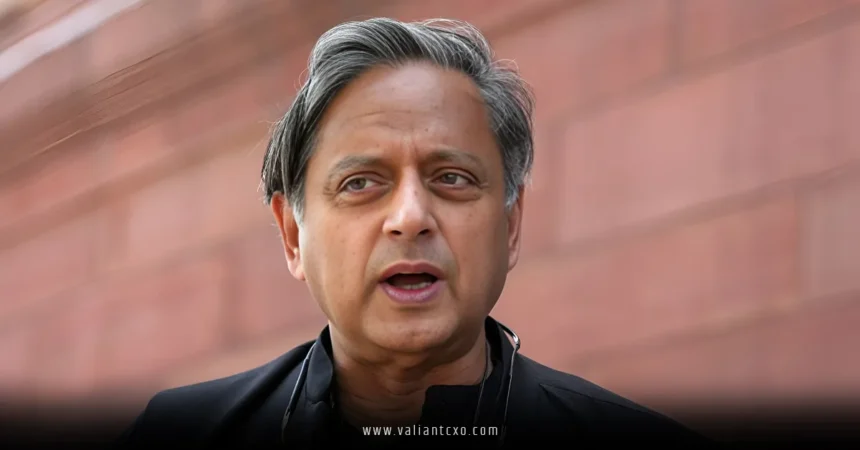Tharoor Defends India’s “Recalcitrance” in US Trade Talks, and it’s sparking conversations across the globe. When Congress MP Shashi Tharoor clapped back at US Treasury Secretary Scott Bessent’s comment labeling India as “recalcitrant” in trade negotiations, it wasn’t just a war of words—it was a declaration of India’s resolve to protect its interests. But what’s behind this fiery exchange? Is India’s so-called recalcitrance a defiant stand against unfair trade demands, or is it a calculated move to carve out a stronger position on the global stage? Let’s dive into this high-stakes drama and unpack what it means for India, the US, and the world.
What Sparked Tharoor’s Defense of India’s “Recalcitrance”?
The phrase “recalcitrant” isn’t one you hear every day, but when Scott Bessent used it to describe India’s stance in trade talks, it lit a fire. Tharoor Defends India’s “Recalcitrance” in US Trade Talks, by arguing it’s better to be stubborn than to roll over in the face of injustice. Picture this: you’re at a negotiating table, and someone’s trying to strong-arm you into a deal that doesn’t sit right. Do you cave, or do you stand your ground? India, according to Tharoor, is choosing the latter.
The context here is critical. The US, under President Donald Trump, slapped a hefty 50% tariff on Indian goods, including a 25% penalty for India’s purchase of Russian oil. This move, set to take effect on August 27, 2025, sent shockwaves through New Delhi. The Ministry of External Affairs didn’t mince words, calling the tariffs “unjustified and unreasonable.” Tharoor’s response, posted on X on August 14, 2025, was a direct jab: “Far better to be recalcitrant than to be tractable, submissive or acquiescent to injustice.” It’s like India saying, “We’re not here to play doormat.”
Why Did the US Call India “Recalcitrant”?
So, why the label? Bessent’s comment came during a Fox Business interview when he was pressed about wrapping up trade deals by October 2025. He noted that while negotiations with countries like Switzerland were ongoing, India was proving to be a tough nut to crack. Tharoor Defends India’s “Recalcitrance” in US Trade Talks, but what does “recalcitrant” even mean in this context? It’s a fancy way of saying India’s not budging—whether it’s on tariffs, trade terms, or geopolitical pressures like its oil purchases from Russia.
The US wants India to align more closely with its trade vision, but India’s got its own priorities. Think of it like a chess game: the US is making bold moves, but India’s not afraid to counter with a strategy of its own. The tariffs, especially the ones tied to Russian oil, feel like a power play to some. Is the US trying to flex its muscles, or is it genuinely frustrated with India’s firm stance? Either way, Tharoor’s defense has turned this into a global talking point.
The Bigger Picture: India’s Trade Strategy
Tharoor Defends India’s “Recalcitrance” in US Trade Talks, but this isn’t just about one politician’s witty comeback. It’s about India’s broader approach to trade in a world where economic power is shifting. India’s been pushing back against what it sees as unfair trade practices, and the US tariffs are a prime example. The 25% penalty for buying Russian oil? That’s not just a trade issue—it’s a geopolitical jab. India’s response, through voices like Tharoor’s, signals a refusal to be bullied.
India’s Economic Priorities
India’s economy is a juggernaut in the making, but it’s not without challenges. With a growing middle class, booming tech sector, and strategic geopolitical position, India wants trade deals that reflect its ambitions. Tharoor Defends India’s “Recalcitrance” in US Trade Talks, because he sees India’s stance as a defense of national interests. For instance, India’s purchase of Russian oil is a pragmatic move—keeping energy costs low in a country where millions still struggle with poverty. Should India sacrifice that for a trade deal that might favor the US more?
The negotiations, set to continue with a US team visiting India in late August 2025, aim to finalize the first phase of a bilateral trade agreement by fall. But India’s not rushing in. It’s like a cautious buyer at a bazaar, carefully inspecting the goods before committing. Tharoor’s stance underscores this: India won’t sign a deal that compromises its economic security or sovereignty.
The Role of Tariffs in Global Trade
Tariffs are like the spice in a diplomatic curry—too much, and the whole dish is ruined. The US’s 50% tariffs on India, including the oil-related penalty, have raised eyebrows. Tharoor Defends India’s “Recalcitrance” in US Trade Talks, arguing that India’s pushback is a response to what it sees as an overreach. The US claims it’s protecting its interests, but India’s Ministry of External Affairs has called the move “unfair.” It’s a classic case of tit-for-tat, with both sides digging in.
What’s at stake? For India, it’s about safeguarding industries like pharmaceuticals, textiles, and tech, which face stiff competition from US markets. For the US, it’s about maintaining leverage in a world where China and India are rising powers. Tharoor’s defense is a reminder that India’s not just a market—it’s a player with its own rules.
Tharoor’s Wordplay: A Linguistic Jab
Let’s talk about Shashi Tharoor for a second. The man’s got a way with words, doesn’t he? Tharoor Defends India’s “Recalcitrance” in US Trade Talks, and in true Tharoor fashion, he’s got everyone Googling “recalcitrance.” The Oxford Dictionary defines it as being unwilling to obey rules or being difficult to control. Sound familiar? It’s a term Tharoor’s used before, famously in a 2019 stand-up comedy stint where he quipped about his childhood “recalcitrance” when asked to speak English for guests.
When an X user tried to troll him with a string of equally obscure words, Tharoor’s response was gold: “Bhai, aap kehna kya chahte ho?” (Brother, what are you trying to say?) It’s this blend of wit and wisdom that makes Tharoor’s defense so compelling. He’s not just defending India’s trade stance—he’s turning a diplomatic spat into a cultural moment.
Why Words Matter in Diplomacy
Words like “recalcitrant” aren’t just vocabulary flexes; they carry weight. When Bessent called India recalcitrant, it was a subtle dig, implying India’s being uncooperative. Tharoor Defends India’s “Recalcitrance” in US Trade Talks, by flipping the narrative: recalcitrance isn’t a flaw—it’s a strength. It’s like saying, “Call us stubborn, but we’re stubborn for a reason.” In diplomacy, where every word is a chess move, Tharoor’s response is a masterstroke.
The Geopolitical Angle: Russia, Oil, and Power Plays
Tharoor Defends India’s “Recalcitrance” in US Trade Talks, but there’s a bigger geopolitical game at play. The US’s 25% tariff on India for buying Russian oil isn’t just about trade—it’s about geopolitics. India’s energy imports from Russia have been a sore point for the US, especially amid tensions over Ukraine. But for India, Russian oil is a lifeline, keeping energy prices manageable in a country with massive energy demands.
Imagine you’re India, balancing a tightrope between global powers. On one side, the US wants you to ditch Russian oil and align with its trade and geopolitical goals. On the other, Russia offers affordable energy that keeps your economy humming. Tharoor’s defense is a nod to this delicate dance—India’s not saying no to the US, but it’s not saying yes to everything either.
What’s Next for India-US Trade Talks?
With the sixth round of trade negotiations slated for August 2025, the stakes are high. Tharoor Defends India’s “Recalcitrance” in US Trade Talks, but will India’s stance hold? The US team, led by Trade Representative Jamieson Greer, is pushing for a deal by fall. India, meanwhile, is signaling it won’t budge unless the terms are fair. It’s like two heavyweights in a boxing ring, each waiting for the other to blink.
India’s suggested retaliatory tariffs, as floated by Tharoor and others, could escalate tensions. Posts on X have quoted Tharoor urging a 50% tariff on American exports, a bold move that could hit US industries like tech and agriculture. But escalation isn’t the goal—India wants a deal that respects its sovereignty and economic needs.
The Global Impact of India’s Stance
Tharoor Defends India’s “Recalcitrance” in US Trade Talks, and it’s resonating beyond India’s borders. Other nations, especially in the Global South, are watching closely. If India can hold its own against a superpower like the US, it sets a precedent. It’s like the underdog in a movie standing up to the bully—and the audience is rooting for them.
Lessons for Other Nations
India’s approach could inspire countries like Brazil, South Africa, or Indonesia to take a firmer stance in their own trade talks. Tharoor’s defense isn’t just about India—it’s about the right of emerging economies to demand respect. In a world where trade rules often favor the West, India’s recalcitrance is a wake-up call. Why should developing nations always play by rules that don’t serve them?
The Ripple Effect on Global Markets
The India-US trade spat could shake up global markets. Tariffs on Indian goods could raise prices for US consumers, while India’s potential retaliatory tariffs could hit American exporters. Tharoor Defends India’s “Recalcitrance” in US Trade Talks, but the fallout could affect everything from tech stocks to oil prices. It’s a reminder that trade isn’t just about numbers—it’s about power, pride, and priorities.
Conclusion: A Stand for Sovereignty
Tharoor Defends India’s “Recalcitrance” in US Trade Talks, and it’s more than a catchy headline—it’s a bold statement of India’s growing confidence on the world stage. By standing firm against what it sees as unfair tariffs and geopolitical pressure, India is carving out a path that prioritizes its people and its future. Tharoor’s witty defense, paired with India’s strategic resolve, shows that recalcitrance isn’t about being difficult—it’s about demanding respect. As negotiations continue, the world’s watching. Will India and the US find common ground, or will this trade tussle reshape global alliances? One thing’s clear: India’s not backing down, and that’s a story worth following.
So, what’s your take? Is India’s recalcitrance a risky gamble or a necessary stand? Dive into the conversation and let’s keep the debate alive.
FAQs
1. What does “recalcitrance” mean in the context of Tharoor Defends India’s “Recalcitrance” in US Trade Talks?
Recalcitrance refers to India’s unwillingness to easily agree to US trade demands, as highlighted by Shashi Tharoor. It’s about standing firm against terms that may not serve India’s interests, like unfair tariffs.
2. Why is Tharoor Defends India’s “Recalcitrance” in US Trade Talks significant?
Tharoor’s defense underscores India’s resolve to protect its economic sovereignty. It signals that India won’t bow to pressure, setting a tone for future negotiations and inspiring other nations.
3. How do US tariffs impact India, as noted in Tharoor Defends India’s “Recalcitrance” in US Trade Talks?
The US’s 50% tariffs, including a 25% penalty for India’s Russian oil purchases, could raise costs for Indian exporters and strain trade relations, prompting India’s firm stance.
4. What are the next steps after Tharoor Defends India’s “Recalcitrance” in US Trade Talks?
Negotiations will continue in August 2025, with India pushing for fair terms. Retaliatory tariffs on US goods are also being considered to counter the US’s moves.
5. How does Tharoor’s word choice affect the narrative of India’s “Recalcitrance” in US Trade Talks?
Tharoor’s use of “recalcitrance” turns a diplomatic critique into a point of pride, framing India’s stance as a justified resistance to unfair trade practices.
For More Updates !! : valiantcxo.com


